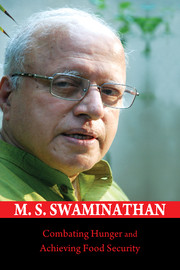Book contents
- Frontmatter
- Contents
- Foreword
- Preface
- Acknowledgements
- Abbreviations
- 1 Genesis and Growth of the Yield Revolution in Wheat
- 2 Our Agricultural Heritage
- 3 Shaping Our Agricultural Destiny
- 4 Thrust on Farm Revival
- 5 Nutri-farm Movement
- 6 Nutrition-sensitive Agriculture
- 7 Food Losses and Food Waste
- 8 Rice in Zero Hunger Challenge
- 9 Monsoon Management
- 10 Importance of Ecological Conservation
- 11 Caring for Ecology and Heritage
- 12 Conserving Biodiversity
- 13 Overcoming Hidden Hunger through Aquaculture
- 14 Biofuels – The Way to Go
- 15 Food Security
- 16 Vigilance for Sustainable Food Security
- 17 Food Security and Social Protection
- 18 Food Security and its Role
- 19 Sustaining the Livestock Revolution
- 20 Challenges in the Year of Science
- 21 Agriculture and Humanism
- 22 Fostering the Science of Science Communication
- 23 Olympic Move for Saving Children
- 24 Youth: The Agents of Change
- 25 Role of Women in Agricultural Production
- 26 Know-how to Do-how
- 27 From Bengal Famine to Right to Food
- 28 Financial Institutions and Fighting Food Inflation
- 29 Public Good Research in Agriculture
- 30 The Future of Indian Agriculture
- Bibliography
13 - Overcoming Hidden Hunger through Aquaculture
Published online by Cambridge University Press: 18 December 2015
- Frontmatter
- Contents
- Foreword
- Preface
- Acknowledgements
- Abbreviations
- 1 Genesis and Growth of the Yield Revolution in Wheat
- 2 Our Agricultural Heritage
- 3 Shaping Our Agricultural Destiny
- 4 Thrust on Farm Revival
- 5 Nutri-farm Movement
- 6 Nutrition-sensitive Agriculture
- 7 Food Losses and Food Waste
- 8 Rice in Zero Hunger Challenge
- 9 Monsoon Management
- 10 Importance of Ecological Conservation
- 11 Caring for Ecology and Heritage
- 12 Conserving Biodiversity
- 13 Overcoming Hidden Hunger through Aquaculture
- 14 Biofuels – The Way to Go
- 15 Food Security
- 16 Vigilance for Sustainable Food Security
- 17 Food Security and Social Protection
- 18 Food Security and its Role
- 19 Sustaining the Livestock Revolution
- 20 Challenges in the Year of Science
- 21 Agriculture and Humanism
- 22 Fostering the Science of Science Communication
- 23 Olympic Move for Saving Children
- 24 Youth: The Agents of Change
- 25 Role of Women in Agricultural Production
- 26 Know-how to Do-how
- 27 From Bengal Famine to Right to Food
- 28 Financial Institutions and Fighting Food Inflation
- 29 Public Good Research in Agriculture
- 30 The Future of Indian Agriculture
- Bibliography
Summary
Hidden hunger, caused by the deficiency of micronutrients such as iron, iodine, zinc, vitamin A and vitamin B12, is a serious nutritional problem in India. Iron deficiency in pregnant women leads to anaemia in children, which is characterized by LBW. In our strategy for food and nutrition security, it is important that we pay attention not only to protein and energy under-nutrition, but also to overcoming micro-nutrient deficiencies in the diet. Both horticulture and aquaculture can play an important role in overcoming hidden hunger. The Fish for All Research and Training Centre at Poompuhar in Tamil Nadu was set up for the purpose of imparting training to fishermen and women in all aspects of fisheries ranging from capture or culture to consumption, based on the pedagogic methodology of learning by doing. Aquaculture involves the artificial rearing of fish in ponds using a mixture of fish species like cutla, rohu and mrigal. Capture fisheries involves fishing in rivers, reservoirs, oceans, etc. Fishes in culinary use can be either from marine water or fresh water, using either modern vessels or traditional small boats.
Several threats to fisheries have occurred in different parts of the world. A grave danger is the ocean pollution caused by oil spills, the most serious of which occurred in recent years in the Gulf of Mexico. We also experienced such an oil spill near Mumbai as a result of collision between two ships. This emphasizes the need for more intensive research on bioremediation so that micro-organisms capable of removing oil can be developed and deployed.
How can India develop an aquaculture strategy that can ensure regular supply of fish at affordable prices, for all those who eat fish? Globally and nationally, fisheries and aquaculture contribute significantly to food and nutrition security. About 20 per cent per capita intake of animal protein for more than 2.8 billion people is from fish and for over 400 million people, fish meets 50 per cent of the requirement for animal protein and minerals. Malnutrition is still the number one killer compared to other diseases and fish with its affordable protein and essential nutrients scores over other forms of animal protein. It is a rich source of micro-nutrients, minerals, essential fatty acids and proteins and is valuable for pregnant mothers and in child health and development.
- Type
- Chapter
- Information
- Combating Hunger and Achieving Food Security , pp. 73 - 76Publisher: Cambridge University PressPrint publication year: 2016



